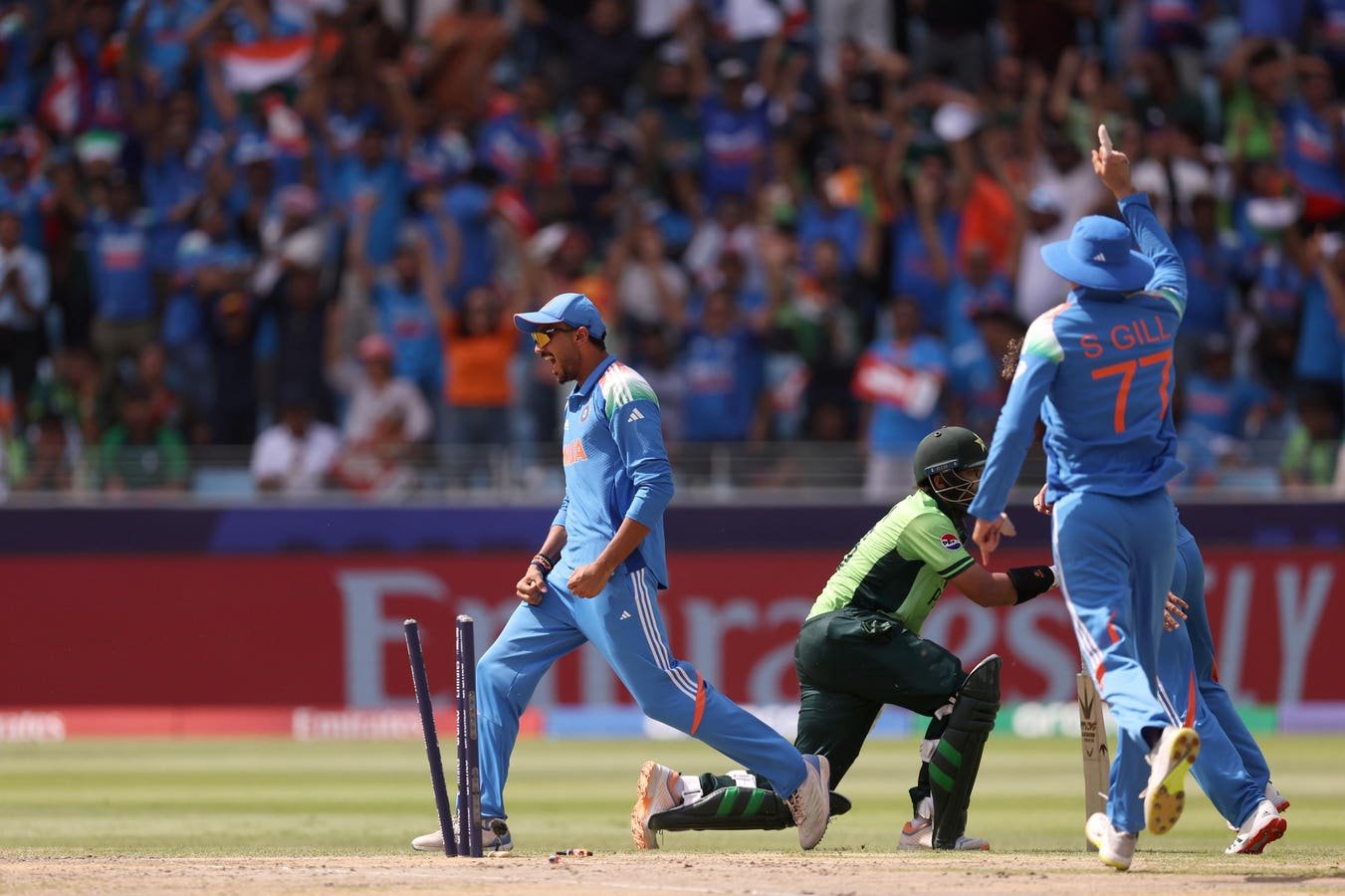India and Pakistan will clash at the Asia Cup (Photo by Alex Davidson-ICC/ICC via Getty Images)
ICC via Getty Images
Cricket might be a quaint British bat and ball game, but its heartland these days is very much rooted in South Asia, where five of the 12 most powerful nations reside. It’s little surprise that the highly lucrative biennial Asia Cup is essentially cricket’s only continental championship of note.
But, in reality, the Asia Cup – run by regional body Asian Cricket Council – would not be financially viable if not for the money-spinner of a contest between India and Pakistan, who as usual are grouped together in the latest tournament starting on September 9 in the United Arab Emirates.
India and Pakistan, rare cricket contests due to tense geopolitics, will play each other on September 14 in Dubai and there is also the distinct possibility of a second contest on the 21st.
Another could also eventuate if the rivals make the final, essentially translating into a three-game series between teams who haven’t played bilateral series against one another for more than a decade due to the political situation.
There is much interest when India and Pakistan meet (Photo by FADEL SENNA/AFP via Getty Images)
AFP via Getty Images
Befitting the thirst for matches between these countries, tickets have been almost exhausted for the match on September 14 and are considerably more expensive than others.
Tickets for the tournament have been bundled together, with general admission passes for three games – including India and Pakistan on September 14 – selling for $134.60.
Most general admission tickets have been sold out, but there are premium tickets selling for $283.38 for the three-game bundle. A hospitality pass for the India-Pakistan game is fetching almost $1000, while a private box for four people is selling for more than $9000.
In contrast, there are tickets starting at $15 for the match between Sri Lanka and Hong Kong on September 15, with the most expensive being $1813.64 for a private box of four.
India’s opening game against host UAE is also modestly priced with tickets starting at $21.25. The steep rise for India-Pakistan matches has led critics to label it as price gouging.
But these games essentially underpin the broadcast deal for the Asia Cup, in turn bankrolling the ACC, its pathways and smaller Asian nations reliant on funding. Established in 1983, the ACC’s goal is to develop and promote cricket in Asia while fostering better relations with member nations.
“The entire monetization of the broadcast is based on this one match between India and Pakistan,” former ACC head of commercial and events Prabhakaran Thanraj told me in 2022.
“The men’s Asia Cup is where almost all the funds come from for the ACC. Monetization will help put funds back into cricket.”
This edition of the Asia Cup was supposed to be played in India, but in a deal struck ahead of the Champions Trophy earlier this year, India and Pakistan games are played at neutral venues under a three-year arrangement.
As I reported in June, the eight-team tournament – featuring five Full Members and three Associates – will be played in the UAE after Sri Lanka had been contemplated, it is learned.
Not far from ICC headquarters, Dubai’s main cricket ground has continually stepped up as neutral terrain but matches there have been blighted by empty seats amid sapping heat, creating a soulless feel.
India and Pakistan fans are out in force when their teams meet (Photo by FADEL SENNA/AFP via Getty Images)
AFP via Getty Images
The tournament, which alternates between the 20 and 50-over formats, was in grave doubt after a gun massacre of tourists in April in Kashmir pushed nuclear-armed rivals India and Pakistan to the brink of war.
Cricket, clearly the most popular sport in both countries, was then used as a political football. Politics and cricket are deeply intertwined with ACC chair Mohsin Naqvi, who also doubles as the Pakistan Cricket Board boss, being the country’s interior minister.
While new International Cricket Council chair Jay Shah, who was previously at the helm of India’s governing body, is the son of India home affairs minister Amit Shah.
The tensions are evident and the frosty relations between the countries are constantly straddled by administrators.
“There are some people with strong nationalistic views in positions of power who drive policy,” a senior cricket administrator told me during the ICC’s annual meeting in Singapore recently.
“Tensions aren’t going down and the other Asian (Full Member) countries also get sucked in and it becomes a game of geo-politics.
“There are many tentacles to this and an issue that won’t end.”
It’s a murky and thorny situation, but – for at least three hours on September 14 and possibly beyond – all eyes will be on the cricket field, where another chapter of cricket’s most heated rivalry will be written.

